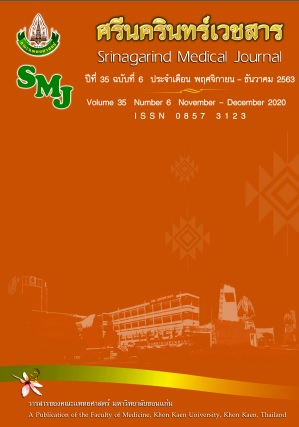Factors Affecting Distance of 6-Minute Walk Test in Post Cardiovascular Surgery Patients after Discharge at Queen Sirikit Heart Center of the Northeast
Abstract
ปัจจัยที่มีผลต่อระยะทางที่ได้จากการทดสอบสมรรถภาพทางกายด้วยการเดิน 6 นาที ในผู้ป่วยหลังผ่าตัดหัวใจและหลอดเลือด หลังจำหน่ายออกจากศูนย์หัวใจสิริกิติ์ ภาคตะวันออกเฉียงเหนือ
มนตรี ยาสุด1*, เบญจา ทรงแสงฤทธิ์1, พจีมาศ กิตติปัญญางาม2
1 ศูนย์หัวใจสิริกิติ์ ภาตะวันออกเฉียงเหนือ คณะแพทยศาสตร์ มหาวิทยาลัยขอนแก่น
2 ภาควิชาเวชศาสตร์ฟื้นฟู คณะแพทยศาสตร์ มหาวิทยาลัยขอนแก่น
หลักการและวัตถุประสงค์: การทดสอบด้วยการเดิน 6 นาที (6-minute walk test: 6MWT) สามารถทำได้ง่ายและเป็นที่นิยม เพื่อวางแผนการฟื้นฟูหัวใจ ประเมินความสามารถการออกกำลังกาย ติดตามการรักษา และพยากรณ์โรค โดยปัจจัยที่ส่งผลต่อระยะทางการทดสอบการเดิน 6 นาที (6-minute walk distance: 6MWD) มีความหลากหลาย การศึกษานี้จึงมีวัตถุประสงค์เพื่อศึกษาปัจจัยที่มีผลต่อ 6MWD ในผู้ป่วยหลังผ่าตัดหัวใจและหลอดเลือดหลังจำหน่ายออกจากศูนย์หัวใจสิริกิติ์ ภาคตะวันออกเฉียงเหนือ
วิธีการศึกษา:เก็บข้อมูลและตัวแปรที่สนใจจากเวชระเบียนผู้ป่วยหลังผ่าตัดหัวใจและหลอดเลือดที่มาติดตามการรักษาครั้งแรกหลังจำหน่ายออกจากโรงพยาบาล ระหว่างวันที่ 1 พฤษภาคม 2560 ถึง 30 เมษายน 2561 วิเคราะห์ข้อมูลทางสถิติโดยใช้ค่าเฉลี่ย ส่วนเบี่ยงเบนมาตรฐาน ค่าสัมประสิทธิ์สหสัมพันธ์ และการวิเคราะห์ถดถอยพหุคูณแบบขั้นตอน
ผลการศึกษา: กลุ่มตัวอย่าง 153 ราย มีค่า 6MWD 276.05 ± 74.43 เมตร ปัจจัยที่มีความสัมพันธ์กับ 6MWD ได้แก่ อายุ เพศ ส่วนสูง อัตราการเต้นหัวใจสูงสุดระหว่างทดสอบ และระดับความรู้สึกเหนื่อยก่อนทดสอบ โดยปัจจัยที่ร่วมกันพยากรณ์ 6MWD (r2 = 0.288, p < 0.001) ได้แก่ อายุ เพศ และระดับความรู้สึกเหนื่อยก่อนทดสอบ
สรุป: ปัจจัยที่ร่วมกันพยากรณ์ 6MWD ในผู้ป่วยหลังผ่าตัดหัวใจและหลอดเลือดหลังจำหน่ายออกจากศูนย์หัวใจสิริกิติ์ ภาคตะวันออกเฉียงเหนือ ได้แก่ อายุ เพศ และระดับความรู้สึกเหนื่อยก่อนทดสอบ
คำสำคัญ: การทดสอบด้วยการเดิน 6 นาที; ผ่าตัดหัวใจ; การฟื้นฟูหัวใจ
Background and objective: The 6-minute walk test (6MWT) is a popular, practical and straightforward test that widely used to guide a cardiac rehabilitation program and assess exercise tolerance, therapeutic effect and prognosis. 6-minute walk distance (6MWD) varies with different factors. This research aimed to study the factors that affect 6MWD in post-cardiovascular surgery patients after discharge at Queen Sirikit Heart Center of the Northeast.
Methods: Data and attractive factors collected from the medical records of the post-cardiovascular surgery patients during their first follow-up after discharge from Queen Sirikit Heart Center of the Northeast from May 1st, 2017 to April 30th, 2018. The statistical analysis applied to mean, standard deviation, correlation coefficient and stepwise multiple regression analysis.
Results: 6MWD mean of 153 subjects was 276.05 ± 74.43 meters. The factors that relate to 6MWD are sex, height, maximum heart rate in the 6MWT, and the rate of perceived exertion before 6MWT. The shared factors in the prediction of 6MWD (r2 = 0.288, p < 0.001) are age, sex, and the rate of perceived exertion before 6MWT.
Conclusions: The affected factors that could predict 6MWD in post cardiovascular surgery patients discharged from Queen Sirikit Heart Center of the Northeast are age, sex, and the rate of perceived exertion before 6MWT.
Keywords: Six-minute walk test; 6MWT; Cardiac surgery; Cardiac rehabilitation


